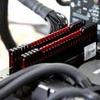Performance Memory
At all times and measurements the system baseclock and multiplier will remain the same, meaning each and every difference you spot on performance is a direct result of changed memory frequency and timings. To give the system a little more power we clocked the CPU towards 4600 MHz on all of its four cores. Only the multiplier has changed meaning the overclock will not adversely influence the performance results.
Memory Read test
Okay the first round of tests, synthetic testing. Above you can see read memory performance of the dual-channel memory configurations at 1600/1866/2933 MHz on the Z97 platform with a Core i7 4770K processor. I threw in the default clocked results as well.
For comparison we included:
- ADATA 2933 CL12 (kit tested at several frequencies)
- GSKILL ARES 2400 MHz CL11
- Corsair 2133 CL9
Now you need to continuously compare memory frequency performance as that is what we'll be looking at today.
As you can see the bandwidth after 2133 Mhz caves in for the ADATA XPG V3 kit, this is due to the extremely high timings. The command rate of 3 and the CAS Latency of 12 is killing system bandwidth. Interestingly enough in real world performance the kit remains to be among the fastest. We'll show you that in the next pages though.




